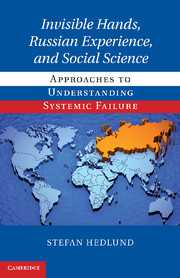 Invisible Hands, Russian Experience, and Social Science
Invisible Hands, Russian Experience, and Social Science Book contents
- Frontmatter
- Contents
- Preface
- Introduction
- 1 Opportunity and Self-Interest
- 2 Scope and Tradition of Social Science
- 3 Markets under Central Planning
- 4 Russia's Historical Legacy
- 5 Markets Everywhere
- 6 Institutional Choice
- 7 History Matters
- 8 Concluding Discussion
- 9 Implications for Social Science
- Bibliography
- Index
2 - Scope and Tradition of Social Science
Published online by Cambridge University Press: 01 June 2011
- Frontmatter
- Contents
- Preface
- Introduction
- 1 Opportunity and Self-Interest
- 2 Scope and Tradition of Social Science
- 3 Markets under Central Planning
- 4 Russia's Historical Legacy
- 5 Markets Everywhere
- 6 Institutional Choice
- 7 History Matters
- 8 Concluding Discussion
- 9 Implications for Social Science
- Bibliography
- Index
Summary
Since time immemorial, discovery and exploration have formed integral parts of human existence. On a mundane level, humans have strived tirelessly to improve their lot by coming up with better practices and by searching for better places to make their living. The outcome has been a steady process of low-tech innovation and of a gradual colonization of new lands. On a more spectacular level, such endeavors have been associated with great names, with individual explorers and inventors whose contributions live on in the history books.
The history of science and exploration most certainly is a fascinating one. At the superficial level it is quite simply a good story. It is hard indeed not to be captured by the adventures of the great explorers, who set out to discover India and China, who delved deep into the heart of Africa, and who raced to be the first to reach the North and the South Poles. Similarly, it is hard not to be captured by the lives and works of the great scientists, who gave us breakthrough knowledge in fields like mathematics, astronomy, physics, and medicine, to mention but a few. Along both of these tracks it is quite clear that humans have been possessed, across cultures, by a drive to discover and to improve.
- Type
- Chapter
- Information
- Invisible Hands, Russian Experience, and Social ScienceApproaches to Understanding Systemic Failure, pp. 45 - 76Publisher: Cambridge University PressPrint publication year: 2011


